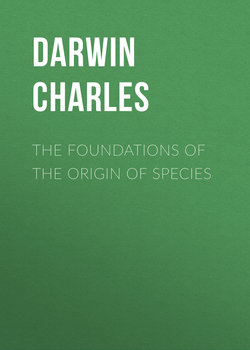Читать книгу The Foundations of the Origin of Species - Чарльз Дарвин, Darwin Charles - Страница 15
PART I
CHAPTER I
ON THE VARIATION OF ORGANIC BEINGS UNDER DOMESTICATION; AND ON THE PRINCIPLES OF SELECTION
Crossing Breeds
ОглавлениеWhen once two or more races are formed, or if more than one race, or species fertile inter se, originally existed in a wild state, their crossing becomes a most copious source of new races202. When two well-marked races are crossed the offspring in the first generation take more or less after either parent or are quite intermediate between them, or rarely assume characters in some degree new. In the second and several succeeding generations, the offspring are generally found to vary exceedingly, one compared with another, and many revert nearly to their ancestral forms. This greater variability in succeeding generations seems analogous to the breaking or variability of organic beings after having been bred for some generations under domestication203. So marked is this variability in cross-bred descendants, that Pallas and some other naturalists have supposed that all variation is due to an original cross; but I conceive that the history of the potato, Dahlia, Scotch Rose, the guinea-pig, and of many trees in this country, where only one species of the genus exists, clearly shows that a species may vary where there can have been no crossing. Owing to this variability and tendency to reversion in cross-bred beings, much careful selection is requisite to make intermediate or new permanent races: nevertheless crossing has been a most powerful engine, especially with plants, where means of propagation exist by which the cross-bred varieties can be secured without incurring the risk of fresh variation from seminal propagation: with animals the most skilful agriculturalists now greatly prefer careful selection from a well-established breed, rather than from uncertain cross-bred stocks.
202
The effects of crossing is much more strongly stated here than in the Origin. See Ed. i. p. 20, vi. p. 23, where indeed the opposite point of view is given. His change of opinion may be due to his work on pigeons. The whole of the discussion on crossing corresponds to Chapter VIII of the Origin, Ed. i. rather than to anything in the earlier part of the book.
203
The parallelism between the effects of a cross and the effects of conditions is given from a different point of view in the Origin, Ed. i. p. 266, vi. p. 391. See the experimental evidence for this important principle in the author’s work on Cross and Self-Fertilisation. Professor Bateson has suggested that the experiments should be repeated with gametically pure plants.
